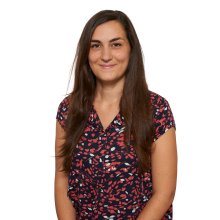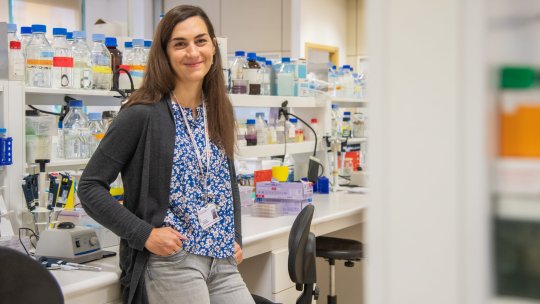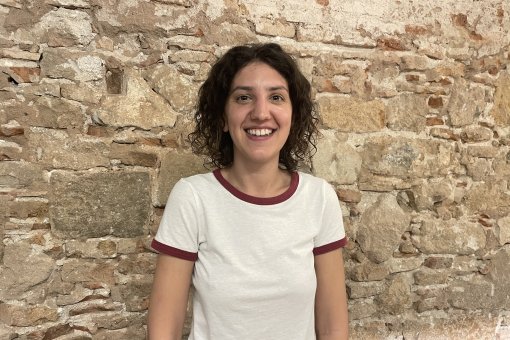Images
Participants

Contact

Born in Bulgaria in 1986, Dr. Alexandra Avgustinova completed her schooling in Germany, graduated in Biological Sciences from the University of Oxford in 2005, and did her PhD at the Institute of Cancer Research London (2012).
She joined IRB Barcelona in 2013 when she took up a postdoctoral position in Dr. Salvador Aznar Benitah's lab. She's now the PI of the Paediatric Cancer Epigenetics group at the Sant Joan de Déu Institut de Recerca.
"Female PIs with kids were extremely rare in my environment when I was a PhD student"
What's your field of expertise and what does your research address?
It is Cancer biology. In my group, we investigate the early events that lead to childhood cancer, which is often driven by epigenetic rewiring.
What is epigenetics?
Our bodies are built from a plethora of different cell types, for instance, skin cells, neurons, immune cells, and many more. These distinct cell types not only look very different but also have highly specialised and distinct functions. Yet all of them contain the same DNA sequence as their “instructions”.
The DNA, and the histones that it is wrapped around, carry specific chemical modifications, or epigenetic marks, that indicate which building blocks or genes, a particular cell will need, and which should be inactivated. Epigenetic regulation is therefore extremely important during development, a process in which a whole organism is generated from a single cell.
When did you get involved in cancer research?
After finishing my BA in Biological Sciences at the University of Oxford, I went straight into my PhD in Cancer Studies. I was working on breast cancer. I was specifically interested in how cancer cells interact with the “normal” cells in the body. This is important, as a cancer cell´s niche or context can facilitate its spread, or indeed prevent it. That´s where it all started for me.
What has becoming a PI been like?
I started my lab in the middle of the COVID-19 pandemic, which was a challenge in itself. It's been a steep learning curve since day 1. I'm much less in the lab than I thought I would be, as there's a lot of organisational paperwork—I don't enjoy that part that much.
However, I do very much enjoy writing grants, developing projects, and interacting with the people in my group. I think we learn a lot from each other, and that has been a very rewarding experience for me. I realised that being a PI allows you to be involved in more projects and explore many of the questions you are interested in, as you have a team to support you.
What challenges did you face when you started your independent lines of research?
The big change for me was switching from adult cancer (I addressed breast cancer during my PhD and skin cancer during my postdoc period) to paediatric cancer. It is a very different disease. Adult cancer is a disease of ageing, where over time we accumulate mutations due to a variety of factors, including environmental exposures.
In contrast, we view paediatric cancer as “development gone wrong”: very specific (and few!) alterations in the right progenitor cell lock it in an immature and highly proliferative state. Thus, childhood cancers are more genetically simple as compared to the adult disease. Even so, they can be very aggressive, and targeted treatment strategies are often lacking.
Give us an idea of a project that you are currently working on.
We're developing a project on malignant rhabdoid tumours, which are rare and deadly. They occur in children, with a median age at diagnosis of 2, and 5-year survival of less than 20%. There are treatments for this type of cancer but these are comprised of combinations of chemotherapy and radiotherapy, which are very harsh for such young children and have very severe long-term side effects with repercussions for the quality of patients' lives.
Currently, we don't know enough about these tumours to be able to develop targeted therapies. So in this project, we're studying the basic biology underlying the initiation of these tumours, including the cell it develops from, or its “cell of origin”.
We believe that this cancer is caused by the inability of its cell of origin to perform its normal function, as it is unable to differentiate. We want to understand the normal differentiation pathway and explore whether we can revert the error that caused the maturation block.
Ultimately, we want to develop precision therapy for these patients. One of the active lines of research is gene editing for this type of tumour. You see, this cancer involves the loss of a gene, and we have seen that, when this gene is reinstated in vitro, the cells stop proliferating. If we were able to do this in vivo, it would mean that the cells with the mutation would stop growing. This would not cause the tumour to shrink but it would prevent it from growing further.
What are the mental challenges of working in paediatric cancer?
When I first started working on pediatric cancer, I found it extremely hard emotionally. To learn more about these diseases I took the opportunity to attend Tumour Boards, which are meetings where the clinicians discuss current cases. So I heard about real-life cases and patient histories.
Involuntarily, I compared how old the patients were with respect to my own kids, which really hit home. Also, we are very lucky to get donations from some families that have been affected by childhood cancer. I have met some of them. This makes things “really real” so to speak.
These experiences have been very powerful, and I draw on them for motivation and to push forward, in the hope that our research could maybe one day make a difference to some of these personal stories.
You have lived in lots of different places. As a scientist, what's special about Barcelona?
Yes, I've moved around quite a lot. I was clearly looking for something, and I found it here. Barcelona is my home now.
When I first came here 10 years ago, I think Barcelona was on par with Madrid as a city in which to do science. Madrid is home to CNIO, CSIC, universities, etc. But there's been a lot of investment in Barcelona and this is set to culminate with the BIST Building, the Mercat del Peix...which will be home to several world-class research centres. Then there's the new "la Caixa" Research Institute and lots of start-up companies. There are lots of synergies going on in the city. So right now, between Madrid and Barcelona, I think Barcelona comes out on top.
How has IRB Barcelona contributed to where you are today?
It's been essential. I wouldn't say that I always wanted to be a PI but I'm very grateful to Salvador Aznar because he gave me room to be independent, to grow, to take my projects in the direction that I wanted, and to do what I enjoyed. I had a lot of freedom. I had a wonderful time at IRB Barcelona. I met a lot of fantastic people, and I feel that I had the opportunity to do very good science here. The cool thing about the friendships I formed during my postdoc is that lots of my friends are starting PI positions too, and we are already planning some exciting collaborations.
How often do you visit IRB Barcelona?
I'm here all the time. First, the Paediatric Cancer Centre, a new building devoted entirely to oncology on the same site as the hospital, was opened last year. But the pandemic has caused delays and the labs are not going to be ready until March. Because of my time at IRB Barcelona, I've been able to negotiate the use of the cell culture facility and flow cytometry facility, for instance. I also collaborate with several PIs here: Roger Gomis, Núria López-Bigas, Fran Supek, and Cayetano González.
What is it like to have been awarded an ERC grant?
I got the ERC grant in November 2022. It provides €1.5M over 5 years. I feel like I have been lucky as there is so much competition for this funding. My group currently has two PhD students and a senior postdoc. Because of the grant, I am now in a position to hire another three to four people, so effectively doubling the size of the lab. Also, having an ERC grant strengthens my future project proposals.
Given the importance of grant writing at later career stages, what kind of things do you think a PI can do to foster this skill among PhD students?
I'm trying to give PhD students more training in writing, so they write their fellowships, and we go through them together. Also, I make sure we make time to critically discuss papers together – this, and passing on any suitable papers that the PI has to review, and then discuss the key points together, is really important to foster critical thinking.
What advice would you give to current PhD students?
They have to enjoy themselves. My time as a PhD and postdoc was great fun. You have to enjoy the science you are doing and not be scared to ask for help. And make friends!
What about the stress?
A lot of the stress depends on the environment you are in. I try to generate a friendly environment in the lab. If you are enjoying yourself most of the time, then you shouldn't be permanently stressed and can cope with the peaks. I encourage PhD students to speak up and talk to their supervisors if they are having trouble.
In the context of the career prospects of female scientists, how important is it for PhD students to have female PIs with kids as role models?
It's really important. Female PIs with kids were extremely rare in my environment when I was a PhD student. When I was thinking about what I wanted to do after my postdoc, a PI position wasn't at the top of my list because I thought I would have to choose between research and a family, and I wanted a family. People need to know that these are compatible life choices.
Well, you have both now. You didn't have to make this choice. What is it like being a successful female PI with a young family?
Sometimes it's really hard, but I feel that having a family balances things for me. When I get home, I have a different role. The kids tell me what they have been doing and I can disconnect from science and any work-related issues when I'm with them.
I want young women to see that you don't have to choose between a research career and a family. That's why I have been involved in the 100tífiques initiative for the last three years. Each year I go to a school to talk to kids of about 12 and I show young girls that science is an option and what a scientific career can look like.
About IRB Barcelona
The Institute for Research in Biomedicine (IRB Barcelona) pursues a society free of disease. To this end, it conducts multidisciplinary research of excellence to cure cancer and other diseases linked to ageing. It establishes technology transfer agreements with the pharmaceutical industry and major hospitals to bring research results closer to society, and organises a range of science outreach activities to engage the public in an open dialogue. IRB Barcelona is an international centre that hosts 400 researchers and more than 30 nationalities. Recognised as a Severo Ochoa Centre of Excellence since 2011, IRB Barcelona is a CERCA centre and member of the Barcelona Institute of Science and Technology (BIST).




